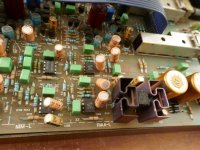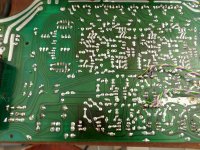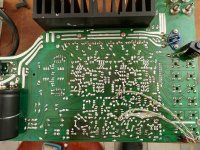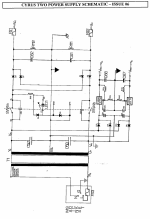I got Cyrus Two (issue 06) with problems. The previous owner said that only one channel works. I tested with headphones and both channels work however one is significantly lower in volume. And there is some distortion.
When I look at the PCB it is clear that some parts have been overheating. First test of Power Supply goes fine until voltage regulators VR1 and VR2. Both put out (+-)17,8V. However these VRs are overheating fast.
I remember reading that these VRs are not very good and could be replaced with better contemporary ones.
The problem is further down the line somewhere. I wonder if there is a obvious place to check first before I start to to follow the signal path step by step?
When I look at the PCB it is clear that some parts have been overheating. First test of Power Supply goes fine until voltage regulators VR1 and VR2. Both put out (+-)17,8V. However these VRs are overheating fast.
I remember reading that these VRs are not very good and could be replaced with better contemporary ones.
The problem is further down the line somewhere. I wonder if there is a obvious place to check first before I start to to follow the signal path step by step?
Last edited:
I found this advice: "
The Electrolytic caps in the phono stage are ageing now and are often the cause of oscillation in the (phono) power supply.
This oscillation can cause modulation in the rest of the system and also overheating of the two regulators."
I wonder if I should take the regulators out and see how it works?
The Electrolytic caps in the phono stage are ageing now and are often the cause of oscillation in the (phono) power supply.
This oscillation can cause modulation in the rest of the system and also overheating of the two regulators."
I wonder if I should take the regulators out and see how it works?
No. regulators prevent parts lower down the line from overheating & burning up.This oscillation can cause modulation in the rest of the system and also overheating of the two regulators."
I wonder if I should take the regulators out and see how it works?
You need to test for the oscillation using an oscilloscope, or an analog AC voltmeter (VOM) with a series .047 uf cap to prevent reading AC volts on DC sources. The VOM can be as low as $30. You'll also need a couple of alligator clip leads (10 for $7 at some parts stores, 10 for $70 at prof distributors) and possibly also a 330 pf cap to nail down that you are looking at oscillation, not music. Oscillation will pass through a 330 pf cap, but it will block music. O-scopes as low as $50 often are not rated for voltages above 50. Read the specs carefully. Scope cards for PC's are a good way to blow up a PC with a dodgy geriatric amp.
All those electrolytic caps are 17 years old and possibly reaching life. If you replace the "one that is bad" the rest will fail one by one as the amp ages. It will be broken all the time. if I like an amp, and it has a problem caused by overage caps, I replace them all. But I test between each two caps installed to ensure I made it better, not worse with bad solder joint or incorrect part or incorrect parts placement. Mark the board with a sharpie for the + side before removing any old electrolytic cap.
Don't work an amp with the power on with two hands. >24 volts across your heart can stop it. Use an alligator clip lead to analog ground (center of 2 rail caps) on the negative meter probe. . Wear no jewelry while working on electronics, 1 v @ 30 amps can burn your flesh to charcoal. Wear safety glasses, solder can splash in your eye & parts can explode.
As I understand these VR1/2 regulate power for Phono stage only. All the rest gets the power from D5/6/7/8. So by unsoldering VRs I just break the connection to power for Phono preamp. Since these have seen rather high temperatures I would replace these anyway(at the cost about 1EUR each).
However now I need to find the cause for only R channel working properly. L gets something, but very little.
However now I need to find the cause for only R channel working properly. L gets something, but very little.
How experienced are you? Regulators can run hot because a load capacitor is leaking. The cyrus load capacitors were built in 2005, to go by date code on the 5332 IC.
Willy nilly replacing parts that haven't been measured bad , especially semiconductors, can insert a lot of soldering errors on your board. Did you measure the voltage out of the regulator? Match the part name? Measuring DC power supplies is about step 3 of the debug procedure, right after checking the fuse. Besides, I bought a load of ON semi regulators that had the same name as the others, but had half the load current rating. Suffix 2nd letter meant the part was ****.
Willy nilly replacing parts that haven't been measured bad , especially semiconductors, can insert a lot of soldering errors on your board. Did you measure the voltage out of the regulator? Match the part name? Measuring DC power supplies is about step 3 of the debug procedure, right after checking the fuse. Besides, I bought a load of ON semi regulators that had the same name as the others, but had half the load current rating. Suffix 2nd letter meant the part was ****.
This amp is built in 1990's. The caps C67 and C68 test out Ok (actually pretty good) - about 490uF ESR 0,13Ohm Vloss 0,3.
Replace those red ROE capacitors. Those always fail and screw with the negative feedback network in the power amp.
Those FRAKO capacitors often go bad as well.
Those FRAKO capacitors often go bad as well.
Yep its quite basic, the phono preamp supply is just LM317/337. It is worth replacing C67/C68 anyway and possibly adding 100nF across them as the 317/337 can misbehave otherwise. But DEFINITELY replace those red ROE capacitors - they are the main cause of trouble in Cyrus One/Two amps.Here is the power supply
Indeed the red ROEs were at fault - cracked and out of specs. Replaced these and voila both channel work. So many thanks for this advice!
I replaced all ROE el caps in Phono power supply. However the problem is still there. VRs heat up fast regardless giving out right voltages. So next is the Phono stage el. caps. These are Elna bipolars so how critical is the quality - it may not be easy to get these?
jaycee, did you mean to bridge the 470uf caps with 100nf? I made a mistake to indicate part numbers - C67/68 are 22uf while C63/64 are 470uF.
I replaced all ROE el caps in Phono power supply. However the problem is still there. VRs heat up fast regardless giving out right voltages. So next is the Phono stage el. caps. These are Elna bipolars so how critical is the quality - it may not be easy to get these?
jaycee, did you mean to bridge the 470uf caps with 100nf? I made a mistake to indicate part numbers - C67/68 are 22uf while C63/64 are 470uF.
Last edited:
A work colleague had a Cyrus with one Chanel down, an electronics repair store quoted a lot to repair a broken circuit board, he brought it into work, I modified an interconnect ( used a tiny slitting saw and spread out the contact pin ) and all was fine ( the rca socket had worn, possibly due to it's vertical axis ), until the mains switch became faulty. Be careful what you stand it on, some softer surfaces can restrict the cooling vents on the underside - giving burnt appearance to caps. He took it home for a bit, then replaced it with a yam.
Easy fix is something I look(and hope) first always.he rca socket had worn, possibly due to it's vertical axis
- Home
- Amplifiers
- Solid State
- Cyrus Two voltage regulator fried.



